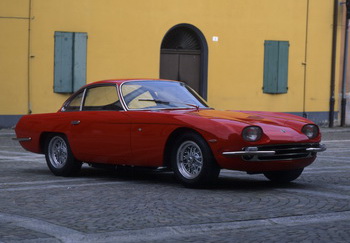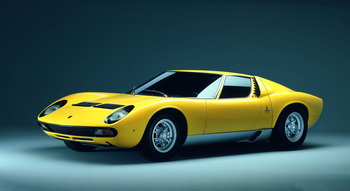 |
|
Characterised by its balanced lines and
developed by Franco Scaglione from
prototypes of the 350 GTV, the 1964 350 GT
was the first Lamborghini to be
mass-produced. With its 3.5 litre, 12
cylinder engine perfected by engineer Giotto
Bizzarrini and rated at 280 hp, it could
reach a maximum speed of 250 km/h. |
|
|
|
|
 |
|
Steady demand for the Miura S prompted
Lamborghini to introduce a more advanced
version called the SV (Super Veloce). This
occurred during development of the
subsequent, revolutionary model called the
Countach LP 500, which made its worldwide
debut in the spring of 1971. The Miura P 400
SV was equipped with a 4 liter, 385 HP V12
engine and attained a maximum speed of over
290 kmh. |
|
|
|
In
2013, the 50th year since it was founded, Lamborghini is
participating in the annual Techno Classica fair at
Essen which opens today and where Lamborghini will be
showing two supercars that have played a large part in
its history.
Introduced in 1964, the 350 GT was the first
mass-produced Lamborghini, while the 1972 P 400 Miura SV
was the final evolution of the legendary Miura - the
first super sports car with a modern design. Both
vehicles on display were taken from the extensive
collection of historic cars in the Lamborghini Museum at
the company’s headquarters in Sant’Agata Bolognese,
Italy.
An expert on
replacement parts for classic cars will also be at the
stand to provide information on original spare parts for
early Lamborghini models.
The Lamborghini 350 GT
Characterised by its balanced lines and developed by
Franco Scaglione from prototypes of the 350 GTV, the
1964 350 GT was the first Lamborghini to be
mass-produced. With its 3.5 litre, 12 cylinder engine
perfected by engineer Giotto Bizzarrini and rated at 280
hp, it could reach a maximum speed of 250 km/h. The
vehicle body featured aluminium components, four-wheel
independent suspension and disc brakes on all four
wheels. And, some models were equipped with a
self-locking differential. By the end of 1966, 120 of
these remarkable vehicles had been produced at
Carrozzeria Touring. The final versions featured a 4
liter engine with the same power as the 3.5 liter power
plant, but with greater torque. Carrozzeria Touring also
produced two Spyders (350 GTS).
The Lamborghini Miura P 400 SV
Steady demand for the Miura S prompted Lamborghini to
introduce a more advanced version called the SV (Super
Veloce). This occurred during development of the
subsequent, revolutionary model called the Countach LP
500, which made its worldwide debut in the spring of
1971. The Miura P 400 SV was equipped with a 4 liter,
385 HP V12 engine and attained a maximum speed of over
290 kmh.
Although it lacked the signature “eyebrows” over the
headlamps, the SV stood out for its new rear suspension,
wider track and more powerful engine. And unlike
previous models, it was equipped with separate
lubrication. The last Miura produced in January 1973 was
purchased by a famous Italian industrialist. 150 of
these remarkable cars were built from 1971 to 1972.
Original Lamborghini Replacement Parts
Preserving the models produced over the fifty-year
history of Automobili Lamborghini is in the interests
not only of Lamborghini itself, but also of the world’s
countless keen collectors of the marque. Authorized
Lamborghini Workshops specialize in servicing classic
Lamborghinis. A web portal that can be entered from any
point in the world provides access to catalogues of
every Lamborghini model and enables the desired spare
part to be conveniently ordered. If a special component
is not available, it can be produced right away from the
original blueprints. An expert in the sector of
replacement parts will be at the Lamborghini stand at
Techno Classica to answer questions about obtaining
original parts for classic Lamborghinis.
Lamborghini’s 50th Anniversary
In 2013, Automobili Lamborghini is celebrating the
50th anniversary of its founding with a series of
international events involving customers, dealers and
fans of the marque. The festivities will hit their high
point with the “Lamborghini 50th Anniversary Grande
Giro".
On May 7-11, more than 300 Lamborghinis from every
period in the company's history will travel 1200
kilometers along the Italian peninsula. On the first
leg, Lamborghini owners from 29 countries will journey
from Milan to Forte dei Marmi. Next, they will continue
on to Rome, and finally return to Bologna on May 10. On
May 11, a Concours d’Elegance will be held in Piazza
Maggiore in Bologna, and all participants will then
parade to Sant’Agata Bolognese, where Lamborghini 50th
celebrations will culminate in a festive gala dinner.
|
|
|